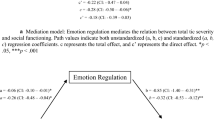Abstract
Research has shown that the severity of tics has a negative impact on how persons with Tourette's syndrome (TS) are perceived by their peers. Likewise, peer education has been found to decrease the negative impact of tics on others' perceptions of persons with TS. In the current study, the differential effectiveness of peer education was evaluated across mild and severe presentations of TS-related tics. After viewing short videotapes of a male or female engaging in mild or severe tic presentations, participants were asked to complete 2 attitude measures along with a behavioral measure of social distance. One half of the participants received education about TS prior to watching the videotape and the remaining participants received no education. Results showed that persons who had received education expressed more positive attitudes toward the persons with TS than did those who had received no education. However, results failed to replicate an earlier study by Woods et al. [Woods, D. W., Fuqua, R. W., and Outman, R. C.(1999). J. Psychopathol. Behav. Assessm. 21: 1–18.] by showing that tic severity did not produce a consistent negative effect on attitudes toward the persons exhibiting tics. Finally, results showed that the male with a severe TS presentation gained greater social benefit from peer education than did the female with a similar TS presentation. The implications of these findings for future research and clinical practice are discussed.
Similar content being viewed by others
References
American Psychiatric Association (1994). Diagnostic and Statistical Manual of Mental Disorders, 4th edn., American Psychiatric Association, Washington, DC.
Boudjouk, P., Woods, D. W., Miltenberger, R. G., and Long, E. S. (2000). Negative peer evaluation in adolescents: Effects of tic disorders and trichotillomania. Child Fam. Behav. Ther. 22: 17–28.
Champion, L. M., Fulton, W. A., and Shady, G. A. (1988). Tourette syndrome and social functioning in a Canadian population. Neurosci. Biobehav. Rev. 12: 255–257.
Ervin, R. A., Miller, P. M., and Friman, P. C. (1996). Feed the hungry bee: Using positive peer reports to improve the social interactions and acceptance of a socially rejected girl in residential care. J. Appl. Behav. Anal. 29: 251–253.
Findley, D. B. (2001). Characteristics of tic disorders. In Woods, D. W., and Miltenberger, R. G., (Eds.), Tic Disorders, Trichotillomania, and Other Repetitive Behavior Disorders: Behavioral Approaches to Analysis and Treatment, Kluwer Academic Press, Norwell, MA, pp. 53–71.
Friedrich, S., Morgan, S. B., and Devine, C. (1996). Children's attitudes and behavioral intentions toward a peer with tourette syndrome. J. Pediatr. Psychol. 21: 307–319.
Gresham, F. M. (1998). Social skills training with children: Social learning and applied behavior analytic approaches. In Watson, T. S., and Gresham, F. M., (Eds.), Handbook of Child Behavior Therapy, Plenum Press, New York, pp. 475–504.
Hagin, R. A., and Kugler, J. (1988). School problems associated with Tourette's syndrome. In Cohen, D. J., Bruun, R. D., and Leckman, J. F., (Eds.), Tourette's Syndrome and Tic Disorders: Clinical Understanding and Treatment, Wiley, New York, pp. 223–236.
Leckman, J. F., King, R. A., and Cohen, D. J. (1999). Tics and tic disorders. In Leckman, J. F., and Cohen, D. J., (Eds.), Tourette's Syndrome: Tics, Obsessions, Compulsions, Wiley, New York, pp. 23–42.
Long, E. S., Woods, D. W., Miltenberger, R. G., Fuqua, R. W., and Boudjouk, P. (1999). Examining the social effects of habit behaviors exhibited by individuals with mental retardation. J. Dev. Phys. Disabil. 11: 295–312.
Seligman, M. (Executive Producer), and James Stanfield Film Associates (Producer) (1984). Stop it, I can't [videotape]. (Available from Tourette Syndrome Association, 42–40 Bell Boulevard, Bayside, NY 11361–2820).
Shady, G., Broder, R., Staley, D., Furer, P., and Papadopolos, R. B. (1995). Tourette syndrome and employment: Descriptors, predictors, and problems. Psychiatr. Rehabil. J. 19: 35–42.
Stephens, R. J., and Sandor, P. (1999). Aggressive behavior in children with Tourette syndrome and comorbid attention-deficit hyperactivity disorder and obsessive–compulsive disorder. Can. J. Psychiatry 44: 1036–1042.
Stokes, A., Bawden, H. N., Camfield, P. R., Backman, J. E., and Dooley, J. M. (1991). Peer problems in Tourette's disorder. Pediatrics 87: 936–941.
Thibert, A. L., Day, H. I., and Sandor, P. (1995). Self-concept and self-consciousness in adults with Tourette's syndrome. Can. J. Psychiatry 40: 35–39.
Walter, A. L., and Carter, A. S. (1997). Gilles de la Tourette's syndrome in childhood: A guide for school professionals. Sch. Psychol. Rev. 26: 28–46.
Woods, D. W. (2002). The effect of video-based peer education on the social acceptability of adults with Tourette's syndrome. J. Dev. Phys. Disabil. 14: 51–62.
Woods, D. W., Friman, P. C., and Teng, E. J. (2001). Physical and social impairment in persons with repetitive behavior disorders. In Woods, D. W., and Miltenberger, R. G. (Eds.), Tic Disorders, Trichotillomania, and Other Repetitive Behavior Disorders: Behavioral Approaches to Analysis and Treatment, Kluwer Academic Press, Norwell, MA, pp. 33–52.
Woods, D. W., Fuqua, R. W., and Outman, R. C. (1999). Evaluating the social acceptability of persons with habit disorders: The effects of topography, frequency, and gender manipulation. J. Psychopathol. Behav. Assessm. 21: 1–18.
Woods, D. W., Long, E. S., Fuqua, R. W., Miltenberger, R. G., and Outman, R. C. (1997). Evaluating the social acceptability of persons with habit disorders. Paper presented at the Meeting of the Association for Behavior Analysis, Chicago, IL.
Yamamoto, K., and Dizney, H. F. (1967). Rejection of the mentally ill: A study of attitudes of student teachers. J. Counsel.Psychol. 14: 263–268.
Author information
Authors and Affiliations
Rights and permissions
About this article
Cite this article
Woods, D.W., Koch, M. & Miltenberger, R.G. The Impact of Tic Severity on the Effects of Peer Education About Tourette's Syndrome. Journal of Developmental and Physical Disabilities 15, 67–78 (2003). https://doi.org/10.1023/A:1021456321200
Issue Date:
DOI: https://doi.org/10.1023/A:1021456321200




